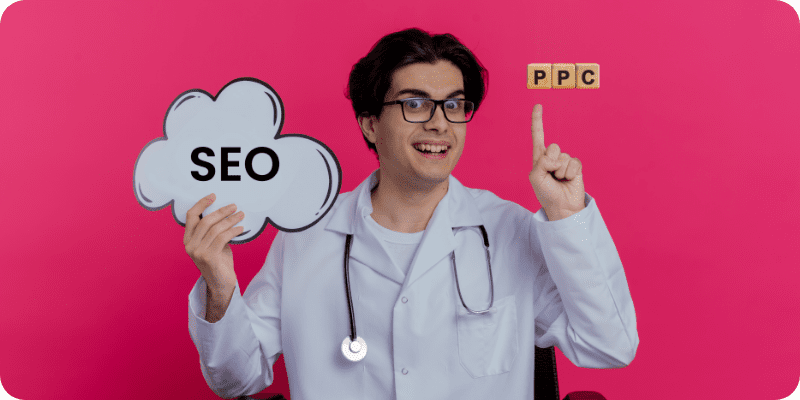When it comes to growing your medical practice online, two powerful tools often come to the forefront: Pay-Per-Click (PPC) advertising and Search Engine Optimization (SEO). Both strategies aim to increase visibility, drive traffic, and convert potential patients into appointments. But, how do you know which is better for your medical practice?
In this blog, we’ll explore the key differences between PPC and SEO, the advantages and disadvantages of each, and provide insights into which strategy may be the right fit for your healthcare business.
What is PPC?
Pay-Per-Click (PPC) is a form of paid online advertising where you pay for each click your ad receives. These ads appear at the top of search engine results pages (SERPs), above the organic listings, and are often marked as "Sponsored" or "Ad."
How PPC Works
- You bid on specific keywords related to your medical services.
- When a user searches for these keywords, your ad may appear.
- You only pay when someone clicks on your ad, hence the name "pay-per-click."
Benefits of PPC for Medical Practices
- Immediate Results: With PPC, your ads can appear at the top of search results almost instantly, bringing quick visibility to your practice.
- Targeted Audience: PPC allows you to target specific demographics such as location, age, and even medical conditions, ensuring your ads reach the right patients.
- Budget Control: You can set your own budget, deciding how much you're willing to pay per click and how much you spend daily or monthly.
- Measurable Performance: PPC platforms like Google Ads offer detailed analytics to track conversions, clicks, and return on investment (ROI).
Drawbacks of PPC
- Cost: The more competitive your targeted keywords are, the more expensive your PPC campaign becomes.
- Temporary Visibility: Once you stop paying for ads, your visibility disappears.
- Ad Fatigue: Users may ignore or develop ad fatigue when they see too many paid advertisements.
What is SEO?
Search Engine Optimization (SEO) is the process of improving your website's organic rankings in search engines like Google. Rather than paying for clicks, SEO focuses on optimizing your content and site structure to naturally rank higher in search results.
How SEO Works
- You create and optimize content with keywords that patients are likely to search for, such as "best cardiologist near me" or "treatment for back pain."
- Search engines use algorithms to rank websites based on relevancy, credibility, and user experience.
- Over time, with consistent SEO efforts, your practice's website climbs the ranks and attracts organic traffic.
Benefits of SEO for Medical Practices
- Long-Term Growth: SEO efforts, once in place, can result in long-term traffic that doesn’t require ongoing payments.
- Credibility and Trust: Organic results are often seen as more trustworthy than ads. Ranking well in organic search can boost your practice’s credibility.
- Cost-Effective: While SEO may require an upfront investment in content and optimization, it’s often more cost-effective in the long run compared to continuous PPC spend.
- Increased Traffic Over Time: As your SEO efforts gain momentum, your website can continuously attract more visitors without additional cost per click.
Drawbacks of SEO
- Time-Consuming: Unlike PPC, SEO does not deliver immediate results. It can take months to see a noticeable increase in organic traffic.
- Algorithm Changes: Search engine algorithms change frequently, which can sometimes result in a drop in rankings if you're not staying up to date.
- Ongoing Maintenance: SEO requires consistent attention, with regular content updates, link building, and technical optimization to maintain rankings.
PPC vs. SEO: A Direct Comparison
| Feature |
PPC |
SEO |
| Speed of
Results |
Immediate |
Slow (months to see results) |
| Cost |
Higher cost per click |
Lower long-term cost (initial investment required) |
| Sustainabi
lity |
Stops when budget is exhausted |
Long-term with continued optimization |
| Targeting |
Highly targeted based on demographics |
Based on search intent and keywords |
| Trust
Factor |
Ads are sometimes viewed skeptically by users |
Organic results seen as more credible |
| Scalability |
Scalable but costly to maintain |
Can scale with ongoing efforts, no cost per click |
Which is Better for Your Medical Practice?
The choice between PPC and SEO depends on your practice’s specific goals, budget, and timeline. Here’s a closer look at how to determine which strategy might work best for you:
Choose PPC if:
- You want immediate visibility and quick results (e.g., opening a new practice or launching a new service).
- You have a budget for ongoing paid advertising and are willing to pay for each new lead.
- You want to target specific demographics or keywords that are particularly competitive.
Choose SEO if:
- You are focused on long-term growth and building a sustainable online presence.
- You want to build trust and credibility through organic search results.
- You have the time and resources to invest in consistent content creation, website optimization, and patient engagement.
Can PPC and SEO Work Together?
Absolutely! In fact, combining both PPC and SEO can create a powerful, well-rounded digital marketing strategy. Here’s how they can complement each other:
- Boosting Short-Term and Long-Term Results: Use PPC for immediate traffic while building your SEO for sustainable growth.
- Keyword Testing: PPC campaigns can help you discover which keywords convert best, giving you insights for your SEO strategy.
- Maximizing SERP Presence: By ranking organically and showing ads for the same keywords, you can dominate the search results page.
Conclusion
Both PPC and SEO are valuable tools for growing your medical practice online. PPC offers immediate visibility and precise targeting, while SEO provides long-term growth and credibility. The best strategy for your medical practice will depend on your goals, budget, and how quickly you need results.
In many cases, a combination of both can offer the most comprehensive approach, allowing you to capitalize on the strengths of each. By understanding your practice's needs and audience, you can tailor a digital marketing strategy that drives patient growth and strengthens your online presence.
Ready to Get Started?
If you’re still unsure which strategy is best for your practice, consider reaching out to a digital marketing specialist with experience in healthcare. They can help tailor a PPC and SEO strategy to fit your specific goals and budget.
Read more on How Email Marketing Can Benefit Your Medical Practice



